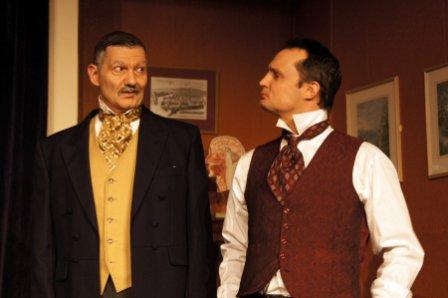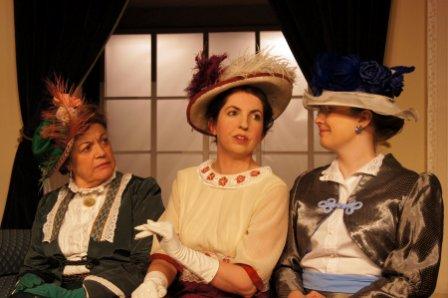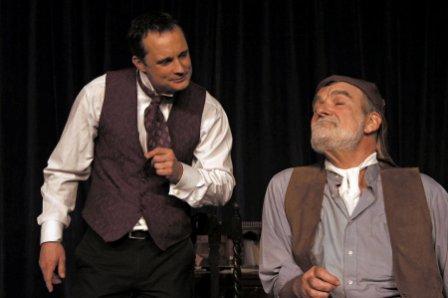|
|
||||||||||||||||||||||||||||||||||||||||||||||||||||||||||||||||||||||||||||||||
Click
here for more pictures of this play |
||||||||||||||||||||||||||||||||||||||||||||||||||||||||||||||||||||||||||||||||
|
||||||||||||||||||||||||||||||||||||||||||||||||||||||||||||||||||||||||||||||||
|
Click here for the NODA crit for this play
Review The programme was, as usual with LADS, excellent. The cover design was good and Jean Cooper's notes as the Director were interesting, informative and explained her approach to the play. Plus the information about Bernard Shaw including contributions from other sources made it a really good read. There was a terrific opening to the play. Operatic music, lightning, thunder and then rain sound effects immediately made the audience sit up and take notice. The Portico which formed part of the opening street scene was impressive but I would have preferred not to have seen Higgin's room behind it. It was a little disconcerting when some of the actors walked behind the Portico. It gave the impression that they were part of the main set. I felt that it could easily have been curtained off. The rain sound effect was at just the right level and finished at just the right moment. Well done to Sarah Biggs the Sound and Lighting Operator. The dismantling of the Portico was clever and efficient thanks to Garry Cooper's design and the stage hands. Overall the sets were great as is always the case with LADS. Higgins' laboratory was believable and the design worked well. The period furniture seemed right to me and the set dressing was good. I did however miss seeing voice recording equipment which is alluded to in the text and a phonograph (as shown on the programme cover) would have been a useful addition. The transformation into Mrs. Higgins' Drawing Room and back again for a later scene was brilliant. The concept of hinged and sliding flats was simple but effective. The stage hands might have moved more quickly and with slightly more purpose but it was the first night and I'm sure they speeded up as the run continued. I did miss a light source. We had general lighting throughout but it wasn't apparent where it was coming from. There was no overhead light or wall lights (which would have suited the period). I understand how this might have created problems with scene changes but shouldn't have been insurmountable. The material used for the window at the back of the set wasn't suitable and could have been improved. Overall though, with the furniture and set dressing, colour schemes and wallpaper together with the flexibility to transform from one scene to another with ease, the whole set up was very good indeed. Set design is credited to one man in the the programme – Garry Cooper, but I subsequently learned that he had a team working with him. Congratulations to them all on a job well done. All of the costumes seemed to be in keeping with the period. The gentlemen looked elegant and the ladies very ladylike. For me though Eliza looked too respectable and clean when we first saw her as a flower girl. Her appearance didn't tie in with Higgins' orders to burn her clothes and give her a bath. That aside, the wardrobe ladies, Liz Adams, Sylvia Zilesnick and Jean Cooper should be pleased with the results of their work. The properties were all good and of the period, there were no hitches with the stage management – set changes were efficient and everything was where it was supposed to be, so well done to Sue Bonner and Lynn Marsh. I thought the minor characters in the opening street scene were all well observed though some could have done with a little more projection. Remember that when you turn to face upstage you must raise the volume. Also take into account that it's the beginning of the play and you have to make an immediate impact, particularly following the spectacular thunder and lightning. I was particularly impressed with Lizzie Tucker as Clara whose cut glass accent was spot on and with Cathy Naylor as the Sarcastic Bystander whose stage presence was quickly apparent. Charlotte Pope and Michael Lewkowisk as Bystanders contributed well to the overall scene as did Michael Kay as Freddy. Freddy Parker as the Taxi Man was also believable. Cathy Naylor doubling up as the Maid later on did so with confidence and excellent projection. Val Jones as Mrs Pearce showed just the right amount of indignation towards Higgins and her accent was well maintained. Wendy Butler as Mrs Eynesford-Hill also gave a solid performance. The part of Mrs Higgins is a tricky one because she's an important character but isn't given a lot to do. Karen Rogers played her well and her facial expressions often conveyed her feelings about her son. Graham Milne looked just right as a dustman and suitably uncomfortable in his wedding clothes. First night nerves may have affected him in his opening scene as there was some struggling for lines. Perhaps because of this there was a tendency to rush his subsequent speeches. More surprise was also needed when he first encounters his daughter transformed from a flower girl into a lady in all her finery. His characterisation though was good and we could certainly believe in him being upset about his change of circumstances. Sarah Hudson gave a confident performance in the challenging role of Eliza. I would have liked a greater contrast between her flower girl voice, which I thought could have been more coarse, and her ladylike voice. However, I did learn that she had been suffering from a throat infection which must have given her problems. We could hear every word though and her speeches were said with conviction. There were some good laughs on her Drawing Room speeches but they would have been even more amusing if they had been played with a slower and more pointed delivery. The pace and the picking up of cues during the rest of her performance was excellent and she should be congratulated for succeeding so well with a difficult role. For me Howard Platt was Colonel Pickering to the life. Upright, solid, sympathetic to Eliza and a perfect gentleman, he underplayed the part to just the right degree. His diction and timing was immaculate and we could completely believe in his characterisation as a military man who had spent time in India. From the flicking of his coat tails to the shaking of the lady's hands, everything was done in accordance with the period. In short, it was a finely judged performance that gave us a Colonel Pickering who, in my view, would grace any stage. Pygmalion relies to a great extent on Higgins and his relationship with Eliza. He is, in essence, a bully with little regard for the effect his experiment may have on her. This came across very clearly in Christian Mortimer's performance. He approached the role wholeheartedly with great energy and attack without losing clarity of speech. His timing and projection was also spot on. The character he portrayed was interesting. There is reference in the play to Higgins being “twitchy” and Christian appeared to have built his performance around that. At times it seemed to be somewhat distracting and might have benefited from cutting back on this particular aspect. Sometimes less is more. Higgins can be played in many different ways and there is always the danger of him becoming boring but this was certainly not the case here. In particular, the difficult, wordy last scene with Eliza was done with great pace with cues being picked up brilliantly by both actors. Christian Mortimer is a fine, experienced actor with great technical ability and although his interpretation of this role was not entirely to my liking, it was a perfectly valid one and one which I'm sure the audience enjoyed. Jean Cooper's direction of the play was pretty much faultless. Her blocking of the moves in particular was great. There was never any masking, movement was natural and the pictures she painted on stage with her actors were always interesting. The pace of the play never flagged (quite an achievement in itself as it is a wordy piece) and even the last scene which is basically a summary of Shaw's views, held up well with the movement and variety she had built in. The ideas she wanted to get across regarding the class system were also conveyed with clarity. There was also a simple, unfussy curtain call which I always appreciate. With any play there will always be different views based on personal taste but, with the exception of Eliza needing more contrast between before and after her transformation and the extent of Higgins' “twitchiness”, I have no differences with Jean's direction of Pygmalion, which resulted in a production of a very high standard. It was extremely enjoyable and was warmly received by the full house who showed their appreciation with a richly deserved, sustained round of applause. Congratulations to Jean and everyone involved. Bernard Moule. |
||||||||||||||||||||||||||||||||||||||||||||||||||||||||||||||||||||||||||||||||



